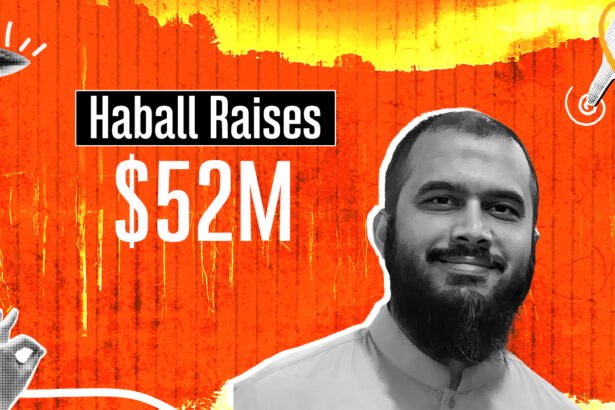In a market where B2B payments still rely on ledgers, cheques, and envelopes filled with cash, digitization isn’t just innovation—it’s a revolution. At the forefront of this quiet but powerful shift is Pakistani fintech company Haball, which has just closed an impressive $52 million equity and debt raise. But this is not your usual “big round, big splash” startup story. Haball’s journey is a study in patience, precision, and purpose.
Here’s an inside look at how the company is transforming Pakistan’s B2B financial infrastructure—and what its long-term ambitions say about the future of fintech in emerging markets.
The $52M Raise – Strategic, Silent, and Smart
Haball’s latest raise consists of:
- ✅ $5 million in equity, led by Zayn VC, alongside Saudi investors, angel backers, and a major Pakistani conglomerate.
- ✅ $47 million in off-balance sheet debt financing from Meezan Bank, Pakistan’s largest Islamic bank.
The company raised these funds slowly and intentionally over several years, tying each tranche to specific milestones—product launches, regulatory approvals, revenue growth, and client onboarding. This incremental model has helped Haball remain capital efficient, avoid unnecessary dilution, and focus on sustainable growth instead of chasing hype.
Haball’s approach is rare in a market where fast scaling and aggressive fundraising often dominate headlines. But the result? A strong foundation, positive unit economics, and a fintech business ready to scale across borders.
The Pain Point: Pakistan’s Dysfunctional B2B Supply Chain
To understand Haball’s mission, you first have to understand the problem it’s solving.
In Pakistan, the B2B ecosystem—especially among SMEs—is plagued by inefficiencies:
- ❌ Payment cycles can take 4-6 days (or more).
- ❌ Inventory is tracked manually in notebooks or from memory.
- ❌ Access to formal financing is limited or non-existent.
- ❌ Reconciliation is often a nightmare, prone to errors and disputes.
This isn’t just a business problem. It’s a systemic drag on productivity, liquidity, and overall economic efficiency. And with SMEs contributing around 60% of Pakistan’s GDP, the ripple effects are enormous.
Haball’s founder, Omar bin Ahsan, saw this firsthand while working on digital tax systems at the Federal Board of Revenue. He realized that without a unified, agnostic digital layer, digitizing payments in such a fragmented landscape was nearly impossible.
So he built one.
The Three-Pillar Model – Payments, Invoicing, and Financing
Haball’s platform revolves around three tightly integrated core services:
- 🔗 Digital Payments Aggregation
Haball allows seamless, real-time payments between manufacturers and SMEs by integrating with banks, ERPs, and supply chain systems. This reduces friction, improves transparency, and minimizes cash handling. - 📄 Digital Invoicing & Tax Compliance
After securing a license from the FBR, Haball now automates invoice generation. This gives both parties visibility into transaction details—what was ordered, when, and for how much—creating a reliable financial trail. - 💰 Islamic Supply Chain Financing
Using the data generated from payments and invoicing, Haball offers Shariah-compliant financing solutions. SMEs can access working capital based on approved invoices, without having to navigate traditional banking hurdles.
This full-stack approach gives Haball a major edge—it’s not just a payments app or a lending platform. It’s the connective tissue between data, payments, and liquidity in the B2B space.
Why Haball matters beyond Pakistan
The company’s long game is clear: become a digital financial backbone for emerging markets, starting with Pakistan and expanding into the Gulf Cooperation Council (GCC) countries.
The GCC is ripe for Islamic supply chain financing solutions, yet options remain limited. As regional governments push to support SMEs and digitize trade, a platform like Haball—with proven tech, a Shariah-compliant model, and operational success—fits perfectly.
The support from Meezan Bank (which has a major presence in Islamic banking) and Haball’s own Shariah advisory board make this expansion not just feasible, but well-positioned.
Why Haball is Winning where others haven’t
Haball is not the first fintech to try supply chain financing in Pakistan. Others, like Finja, have attempted similar models—but without the same success. So what’s different?
- ✅ Infrastructure First: Haball spent years building the rails (payments and invoicing) before jumping into lending.
- ✅ Capital Discipline: The company raised funds only as needed and avoided aggressive burn.
- ✅ De-Risked Lending Model: Instead of taking balance-sheet risk, Haball partners with regulated banks like Meezan for financing.
- ✅ Regulatory Alignment: From the FBR to the SBP, Haball has worked with (not around) the system—earning trust and securing strategic support.
What’s Next for Haball?
With this funding in place, Haball plans to:
- Expand its core product suite in Pakistan.
- Secure a PISP license via Raast, giving it even more control over digital payments.
- Scale into GCC markets, offering Islamic B2B financing infrastructure.
- Deepen its partnership network, especially with banks and enterprise clients.
At its heart, Haball is trying to digitize the financial nervous system of Pakistan’s (and potentially the region’s) B2B economy. It wants to make it easy for a manufacturer to get paid, a distributor to reconcile invoices, and a retailer to access capital—all from one connected platform.
Final Thoughts
In a country where cash is still king and trust often trumps systems, Haball is betting that software—not just capital—is what will truly transform how businesses move money.
Its $52 million raise is not just a financial milestone. It’s a signal that fintech in Pakistan is growing up, that patient growth is still possible, and that real innovation often happens not with a bang—but with a steady, deliberate heartbeat.




